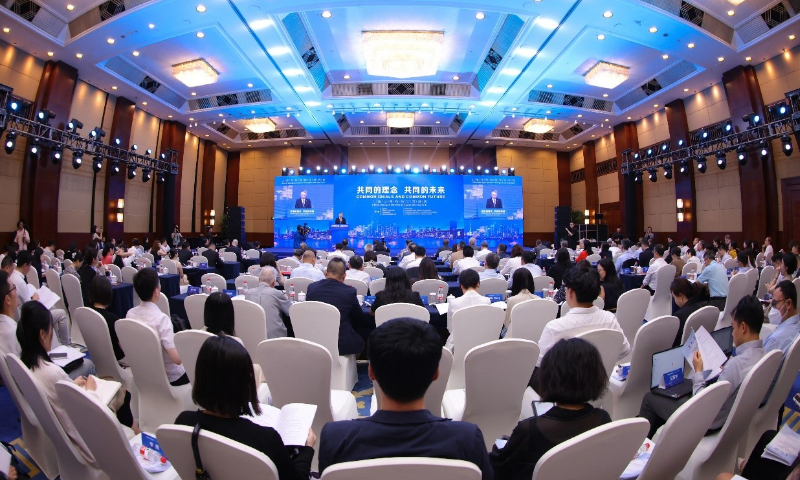'River dialogue' between Shanghai and New York held to strengthen people-to-people exchanges

Centered around the theme of "water," a dialogue between Shanghai and New York with discussions on economic and trade ties, cultural exchanges and waterfront planning, was held in Shanghai on Friday, aiming to foster in-depth explorations of shared opportunities and challenges and strengthen people-to-people exchanges between the two cities.
The event named "Common ideals and common future: a river dialogue between Shanghai and New York," was organized by the Shanghai Public Relations Association, the American Chamber of Commerce in Shanghai (AmCham Shanghai), and the Shanghai Institute of American Studies.
Chinese and American experts and industrial observers discussed how to build mutually beneficial economic and trade relationships, strengthen friendship through cultural exchanges, and create more livable waterfront cities through effective urban planning.
Rivers are precious gifts from nature to cities, which not only nourish the land, but also nurture civilizations. Rivers play a crucial role in the development of cities, serving as both transportation arteries, cultural symbols and catalysts for economic growth, Sha Hailin, president of the Shanghai Public Relations Association said at a speech during the conference.
In Shanghai, the Huangpu River nurtures the city, while in New York, the Hudson River injects vitality. Rivers are important witnesses to the exchanges and cooperation between Shanghai and New York, China and the US, said Sha. This year marks the 45th anniversary of diplomatic relations between China and the US.
Eric Zheng, president of AmCham Shanghai, delivered a speech highlighting the mutually beneficial and win-win economic and trade relations between China and the US. Despite being affected by geopolitical and economic downturns in recent years, US companies operating in China still consider the Chinese market as a very important strategic market, Zheng said in the speech.
Zheng told the Global Times on Friday that they are optimistic about the integrated development of the Yangtze River Delta region. Many of their member American companies are based in Shanghai, and it is hoped that they can expand from Shanghai to the Yangtze River Delta and even nationwide, Zheng said. Using the concept of urban clusters for development will be more sustainable for the future, Zheng noted.
Along with economic ties, cultural exchanges have also played important roles to push forward the sound development between the two cities.
Shanghai is also an important base for China-US sports and cultural exchanges. The spirit of friendship and cooperation among the younger generations can lay a solid foundation for long-term stable relations between the two countries, Yao Ming, FIBA Asia Chairman and President of the Chinese Basketball Association said via a video speech in the conference.
Jeffrey S. Lehman, executive vice chancellor of New York University Shanghai shared his views of college students acting as the natural bridge between the two cities.
Students at the university come from more than 70 different countries and regions. Lehman said that they encourage students to engage with a classmate from another country through conversation or shared activities, to strengthen communication.
"Shanghai and New York are two cities that share much in common. Both are the economic and financial centers of their respective countries, and both are major port cities situated on their respective countries' eastern coasts, where a major river meets the sea," Justin O'Jack, chief representative of the UVA China Office, told the Global Times on Friday.
"Whether it's the Hudson River in New York or the Huangpu River in Shanghai, both river systems have facilitated the flow of goods to and from the world, contributing to their city's economic development over hundreds of years," O'Jack said.
"I vividly remember 30 years ago the first time I stood on the Bund and looked across the Huangpu River to the Pudong side of Shanghai. What was then mostly low-rise industrial buildings and shipping docks now boasts one of the most impressive skylines in the world," O'Jack said.
As an important part of a city, the planning and design of the waterfront areas reflect a high level of emphasis on the scientific and human-centered approach to urban public open spaces. Waterfront planning emphasizes the full utilization of natural resources and the harmonious integration of the built environment, aiming to create a scientific, rational and healthy urban layout, said Zhang Yan, president of Shanghai Global Spatial Planning and Research Institute.